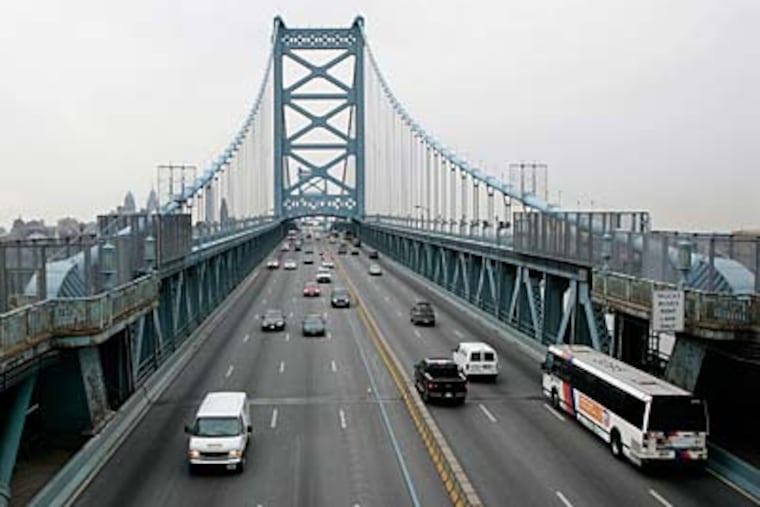Inquirer Editorial: Wrong route on toll hike
Some Delaware River Port Authority officials would have us believe that on the question of hiking tolls, they're between Scylla and Charybdis. On one side, a mob of angry commuters prepares to apply torches to their gleaming waterfront tower if they go ahead with it. On the other, Wall Street suits warn that any hesitation will kill their credit rating and bury them in their own excessive debts and dubious financial instruments.

Some Delaware River Port Authority officials would have us believe that on the question of hiking tolls, they're between Scylla and Charybdis. On one side, a mob of angry commuters prepares to apply torches to their gleaming waterfront tower if they go ahead with it. On the other, Wall Street suits warn that any hesitation will kill their credit rating and bury them in their own excessive debts and dubious financial instruments.
In fact, there's plenty of evidence that the DRPA doesn't have to choose between soaking the commuters and financial Armageddon.
At issue is a 25 percent increase in tolls on the agency's Delaware River bridges, from $4 to $5, scheduled for July (less than three years after the agency's last $1 hike). Also proposed is a 10 percent increase in PATCO rail line fares next month.
Amid revelations of rampant abuses and waste at the agency, as well as an economic downturn that has most governments avoiding tax increases, the DRPA's more enlightened commissioners have urged that the hike be postponed.
At a meeting last week, several financial advisers tried to disabuse them of this muddleheaded concern for the toll-payers. They warned that further delay of the increase - or, according to one, even discussing the possibility - could lead to a rating downgrade. (No word on the effect of just thinking about it.) And because the DRPA is involved in arcane financial arrangements known as swaps, a couple more ratings downgrades could force it to cough up some $200 million in collateral.
Of course, any financial adviser given the option of additional revenue - and no reason to care about the people it comes from - will like the idea. Saying the DRPA's financial advisers think it should increase tolls is like saying your spouse thinks you ought to get a raise.
But for the ratings agencies that grade the DRPA's credit, revenue is just one of many relevant factors. And toll increases have consequences - even from the bean counters' point of view. As Moody's noted in its most recent report on the DRPA, the last toll hike may have brought in more revenue, but it also depressed total traffic.
The DRPA has other options, including millions in unspent, uncommitted funds for pork projects, as well as scheduled capital expenses that may not be pressing.
All the components of this predicament - the overblown debt, the "economic development" misadventures, the financial exotica, and the frayed patience of commuters - are the work of the DRPA itself: its board, its staff, and its advisers. Having wedged themselves into this corner with years of bad policy, they now have to engage in responsible policy-making to get out of it. That's not as easy as charging everyone another buck.
There's still a mystery as to why the crew that steered the DRPA into this iceberg remains at the helm, especially all these long months into the term of New Jersey's supposedly bureaucracy-busting governor. When it comes to this agency, Gov. Christie's reign has brought less terror than torpor.
But at least there have been signs that DRPA officials are starting to get it. Some are pushing for less spending and fewer forays into far-flung projects. The next encouraging sign should be a postponement of the toll hike.